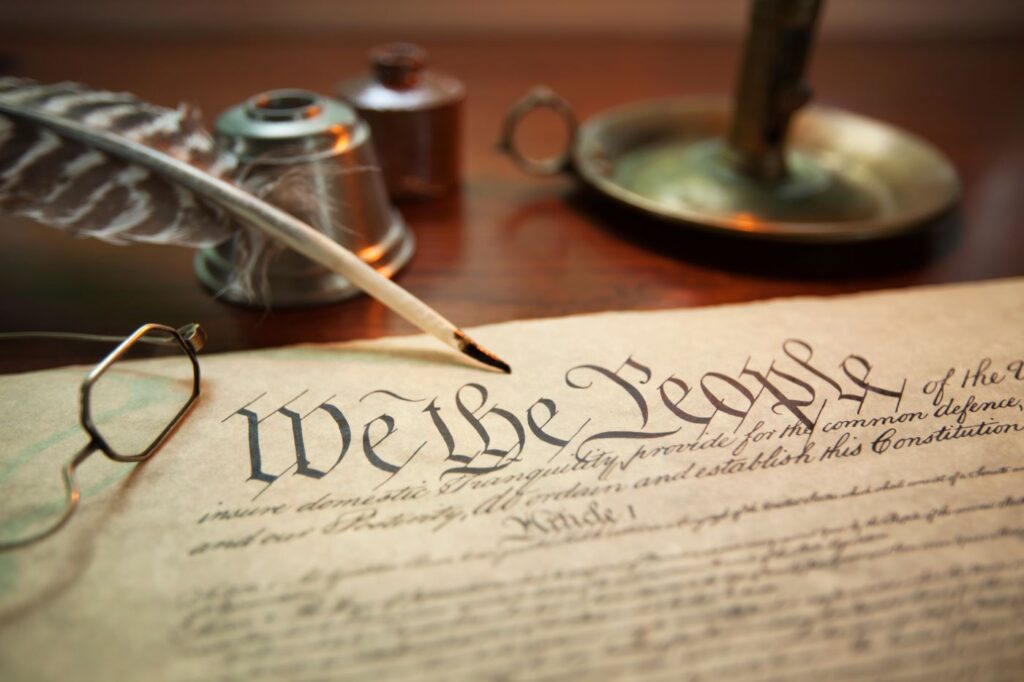What does the natural law have to say about constitutional interpretation? Everything and nothing. Everything, because an adequate natural law theory will offer a full account of the relationship between any act of political ordering and the goods that render political society humanly valuable. But nothing, because the natural law really is indeterminate between several completely reasonable methods of interpretation. Reflection on the natural law’s implications for political activity discloses that the “best” mode of constitutional interpretation will depend on a range of facts that differ from one polity to the next.
What facts? Joel Alicea, Associate Professor of Law at the Catholic University of America, insists on one in particular: how the people made use of their authority in constituting a government. For Alicea, political authority (and thus the authority of our Constitution) has its legitimacy by virtue of being “transmitted” to government by its original and final possessors: the people. A moral obligation to interpret the Constitution according to its original meaning follows from this, Alicea says. Failing to give effect to the original meaning of the Constitution would be to “construe the people’s commands differently from how [they] understood them, . . . effectively nullify [their] authority,” and thereby wield power detached from its only legitimate source.
Alicea’s is a thoughtful theory, a unique attempt to rebut an old criticism of originalism—that it is, to quote Hadley Arkes, a “morally empty jurisprudence.” Unlike some natural law–focused reflections on constitutional interpretation, Alicea devotes considerable energy to developing and exploring the implications of a sound theory of political authority. And, if the theory is correct, it offers relief to those of us worried about Adrian Vermeule’s proposal for a new (or is it classical?) approach to the Constitution—one that would have judges all too ready to discard the plain meaning of the instrument for the sake of delivering substantive justice.
But Alicea’s theory is not as helpful as it may at first appear. “Transmission” of authority from people to regime is not the sine qua non for political authority’s moral legitimacy. Rather, the political legitimacy of a particular regime—to use Alicea’s term, its “moral authority”—is rooted in little more than its being suited to serve the common good. For that to be the case, no “transmission” of authority from people to regime was ever necessary.
Start your day with Public Discourse
Sign up and get our daily essays sent straight to your inbox.Alicea’s View—Authority Transmitted from People to Ruler
Why does Alicea say that political authority is merely delegated to our governors, but belongs, originally and finally, to “the people?” His argument is this: (1) “Political authority must be vested in whoever is responsible for achieving the common good.” (2) “All members of a society [are so responsible], since the common good is necessary to the realization of their own good.” So (3), “the whole body politic is vested with political authority as an original matter because the whole body politic has the responsibility to achieve the common good, and political authority is simply the means to that end.”
Alicea points out that similar theories have appeared throughout the Thomistic tradition, calling our attention to the work of Robert Bellarmine and Francisco Suarez, among others. But, Alicea says, the progenitor of his theory was Thomas Aquinas, and so he recalls the following passage in the Summa Theologiae: “the making of a law belongs either to the whole people or to a public personage who has care of the whole people: since in all other matters the directing of anything to the end concerns him to whom the end belongs.”
I’ll return to Aquinas soon enough, offering a competing interpretation that accords with a sound account of political authority––a view Alicea unfortunately rejects. The remainder of this essay sketches that account, emphasizing that the moral obligation to acquiesce in the authority of a regime (or a constitution) is a function of one’s responsibility to care for the common good, and that “transmission” of authority from people to regime need not have occurred in order for that moral obligation to obtain.
Authority, Practical Reasonableness, and the Common Good
The persons and sub-communities that make up a body politic will inevitably find themselves faced with tensions or disharmonies that threaten to impede their individual and common fulfillment. War looms, resources are lacking, criminals conspire, interests clash, and coordination problems abound. As rational creatures, we grasp that such disharmonies are to be avoided, and their corresponding harmonies to be sought. Practical reason also grasps the normativity of seeking the fair resolution of such disharmonies, for reasonable impartiality between persons is a requirement of justice.
In confronting the dual possibilities of harmony and disharmony in common life, we discover our responsibility for the political common good. We can fall short of this responsibility in any number of ways. A sadistic citizen, for example, might directly will the disharmony threatening political order. Less dramatically, we could neglect our responsibility by simply ignoring the need for order, lured away by the prospect of our own benefit and so failing to heed the moral norm that commends fairness. We can also fail to meet our responsibility to care for the common good by engaging in revolutionary activity unlikely to bring about any improvement that serves the common good. Examples abound, but the important point is this: our responsibility to care for the common good can never require that we act so as to harm, neglect, or endanger it.
As Alicea correctly observes, moral responsibility to care for the common good belongs to every (responsibility-capable) member of a polity. There are, however, distinct means by which we can fulfill our responsibility to care for the common good of any community. In some small communities—say, the community of two friends—this responsibility can be met simply by identifying, respecting, promoting, or heeding the requirements of the relevant common good (friendship). Where decisions of coordination in such communities must be made, unanimous agreement is one available means of resolving the tensions that stand in the way.
But resolving tensions by unanimous agreement is almost always practically impossible in large political communities. Nevertheless, one’s responsibility to care for the common good can be met. For there is another, qualitatively distinct means of serving common goods: authority. When people exercise authority, they issue decisions for the sake of communities (however big or small), and others treat those decisions as binding. Where authority is the tool of choice in serving a common good, one’s responsibility to care for that good may be discharged in one of two forms: either exercising such authority or deferring to it.
The diversity of means by which a common good can be cared for is, I think, all that Aquinas had in mind when he insisted that “the making of a law belongs either to the whole people or to a public personage who has care of the whole people.” Indeed, the whole people has a responsibility to care for the political common good, and one theoretically possible means of discharging that responsibility is achieving unanimous agreement about the implementation of policies serving that good. But, as I’ve indicated, that responsibility can also be discharged when an authority-bearer (whether it be “a public personage” or regime) exercises decision-making power.
The question Alicea seeks to answer is: What makes a regime’s claim to authority legitimate? This is not distinct from asking for an account of the moral obligation to comply with a particular regime’s say-so. The question is a useful one, for though one may recognize that authority is the only practically available means of pursuing a common good well, that fact alone is not enough to establish the moral force of this regime’s claim to authority.
A moral obligation to submit to the authority of a regime emerges as one confronts the reality that one’s choice to either submit or withhold submission will have the effect of either advancing or harming the common good. Concerns about effects are morally relevant, since action, choices, and commitments that damage the common good cannot be proper to the discharging of one’s responsibility to care for it. Two basic judgments about a regime’s effectiveness in serving the common good can converge to generate a moral requirement to submit to its authority. The judgments are these:
(1) That, as a matter of fact, the regime’s directives will by and large be heeded, and so the regime just is in a position to exercise authority effectively for the sake of the common good, and
(2) That noncompliance with that authority would at least do greater harm to the common good than would acquiescing in that authority, notwithstanding that one may judge the regime in place to serve the common good imperfectly (as all regimes do) or even poorly.
John Finnis makes clear the relevance of Judgment (1) above in his pathbreaking book Natural Law and Natural Rights. Responding to Finnis, Alicea objects: “the fact that people do accept [that authority] says nothing, by itself, about whether it should be accepted.” Though Alicea is right that Judgment (1) is not enough to establish political legitimacy, the following account of the relationship between these two judgments defangs his objection.
Judgment (1) operates as a necessary condition for Judgment (2) to obtain. In other words, the conclusion that a regime possesses authority in fact (1) is necessary in order to conclude that failure to submit to it really would jeopardize the common good (2). And though Judgment (1) is not enough to establish a moral obligation to submit to political authority, Judgment (2) is. After all, we will shirk our responsibility to care for the common good if we harm it by failing to submit to a regime. Importantly, Judgment (2) can hold of a regime irrespective of how it came to power (indeed, irrespective of whether that regime even does its job well). And so its moral authority is not dependent on its power’s having been “transmitted” from anyone. Instead, its moral authority (i.e., the moral obligation to submit to it) is illuminated upon confronting the fact–as-it-is that noncompliance would harm the common good.
Someone may object that the theory I’ve presented could justify tyrannical regimes. While it does follow from this theory that one could have a moral obligation to submit to the authority of a bad regime (e.g., if one knows that rebellion would probably result in replacing an inept autocrat with a real tyrant) that does not change the fact that the regime would be a bad one. And it would be a bad one in the following way: it would harm, rather than promote, the common good—say, by depriving citizens of rights that must be in place for the common good to be fostered. Tyrannical regimes certainly have no right to rule, and overthrowing them is indeed morally legitimate when the choice to do so is adopted under the description that it would be likely to serve the common good.
And what about usurper regimes? Alicea might claim that my account of political authority eviscerates the rule of law, or that my position entails that it simply doesn’t matter how a particular regime came to power. I acknowledge that the rule of law is an important component of the common good; it is a principle of fairness that promulgated laws be applied equally to all. But it is also true that promulgated laws or established conventions governing the propagation of a particular regime can in fact harm the common good and so lose their morally binding force: consider for example the established rules and conventions governing the propagation of the Islamic Revolutionary regime in Tehran. In reality, governors need to heed the “rule of law” in acquiring power just to the extent that usurping power by ignoring the rules on the books would harm the common good. Yes, heeding established conventions controlling the transmission of power is almost always in the common good’s interest and so a moral obligation. But revolution—usurpation—is proper from time to time. It was, I think, in 1776, and I hope Alicea would agree.
Submission to political authority can be morally required in view of prudential considerations about how the common good will be preserved or advanced; no transmission of authority from people to regime is necessary in order for compliance with that regime to be morally obligatory, and thus for the regime to be morally legitimate. Before I conclude by spelling out the implications of this fact for Alicea’s theory of constitutional interpretation, consider one analogy that reinforces my central claim that no “transmission” of authority is needed for a regime, or a constitution, to have moral authority.
Submission to political authority can be morally required in view of prudential considerations about how the common good will be preserved or advanced.
The Moral Obligation to Submit—Parents and Children
The theory I’ve outlined accounts for the authority of parents over children. Alicea uses the analogy of the family to discuss the distribution of authority between parents. Uneven distribution of parental authority, Alicea says, does not change the underlying fact that “both parents have parental authority [in principle], because both parents are responsible for the common good of the family.” Similarly, Alicea says, uneven distribution of decision-making power between ruler and ruled does not disprove the fact that authority belongs to both “as an original matter.”
Alicea acknowledges that the family analogy is imperfect. I think it is rather perfect, though not as he employs it. For he forgets one important family constituency, not to be overlooked if the whole family is to be treated analogously to “the whole body politic”—the children. As children reach the age of reason, they come to see that the familial common good belongs to each family member, themselves included. Because children share in that good, the responsibility to care for it does not belong exclusively to their parents; it belongs to them, too. But does it make sense to say that, because both parent and child have responsibility for the familial common good, authority belongs to both “as an original matter?”
No. What belongs equally to each at the most fundamental level is responsibility. A “plan” for the family’s common good that allows both parent and child to discharge that responsibility can (and usually does) meet the requirements of practical reasonableness. For parents, that plan almost always includes exercising authority over their children. For children, it almost always includes submission to the authority of mom and dad. Certainly, no “transmission” is needed for that authority to be legitimate. So why would it be for political authority?
Well, Alicea could challenge the analogy by suggesting that children are naturally subordinate to their parents, whereas no adult in political society is naturally subordinate to any other. So, he might claim, the foundation of political authority’s legitimacy could differ from the foundation of parental authority’s legitimacy.
Here, it’s worth pausing to think about the sense in which the moral obligation for children to submit to their parents is “natural.” Any moral obligation is an obligation of practical reasonableness. Such an obligation can only obtain, then, once one has grasped the intelligible reality of a good to be pursued. In this example, that good is the family’s common good. As children reach the age of reason, they confront the moral reality that this common good is not to be harmed. The responsibility not to harm that good almost always entails an obligation for children to submit to their parents. And the fact that this is “almost always” the case is a “natural” (in the sense of empirical) fact: the real-world know-how of parents, as adults, usually means that they are best positioned to exercise authority for the sake of the family’s common good, and it is a “natural” fact that failure to submit to one’s parents will usually harm the family’s common good. Tying parental authority to the familial common good in this way accounts for the non-absoluteness of the moral norm to submit to one’s parents. That obligation can be defeated when the familial common good requires it—say, if both parents have suffered near totally-debilitating strokes. In such a case, care of the family might fall to a sibling, an aunt, an unrelated caregiver, the state, etc.
Just as children come to grasp the intelligibility of the family’s common good, persons come to grasp the intelligibility of the political common good, and thus of the proposition that “one ought not harm it.” In families and polities alike, the moral obligation to submit to an authority can emerge simply as one confronts a situation as it is—a situation where the choice to disobey can jeopardize the common good in fact. Once again, no transmission needed.
The Upshot for Alicea
Even a sketch of the foregoing’s implications for constitutional interpretation will have to be the subject of another essay. Still, this much should be clear: because transmission-of-authority-from-people-to-regime is not a necessary condition for political authority’s legitimate use, respect for “the people’s authority” is not a necessary condition for morally legitimate constitutional interpretation.
Indeed, even if one grants the (ultimately meaningless) idea that our Constitution does express “the people’s authority,” one would only have a moral obligation to heed that authority if failure to do so would harm or neglect the common good. Any thorough moral evaluation of a political choice—say, the choice to abandon originalism—will reduce to an evaluation of the relationship between that choice and the common good. The nature of that relationship will turn on questions of fact about relevant effects—either harming or promoting the common good. The “people’s authority” will only carry moral weight then, if, as a matter of fact, heeding it promotes the common good better than an alternative scheme—say, setting aside that authority in order to adopt a Vermeulian or Dworkinian approach to the Constitution. Determining whether a particular method of interpreting the Constitution is respectful of “the people’s authority” is only relevant, therefore, if concern for that authority serves the common good in fact.
Alicea repeats often and correctly the age-old insight that responsibility to care for the common good belongs to each member of the political community. But an equal sharing of authority does not follow from that shared responsibility, and no account of the Constitution’s moral authority will succeed if it presumes otherwise.
Image by Daniel Thornberg and licensed via Adobe Stock.














